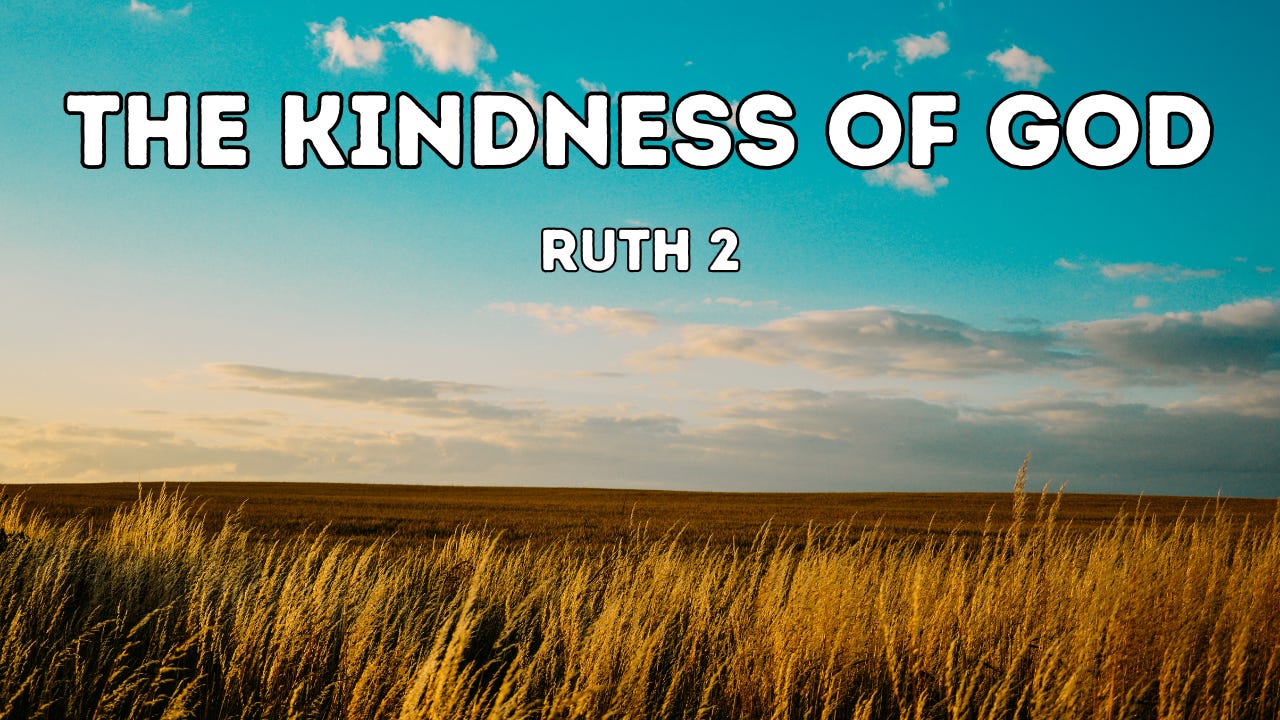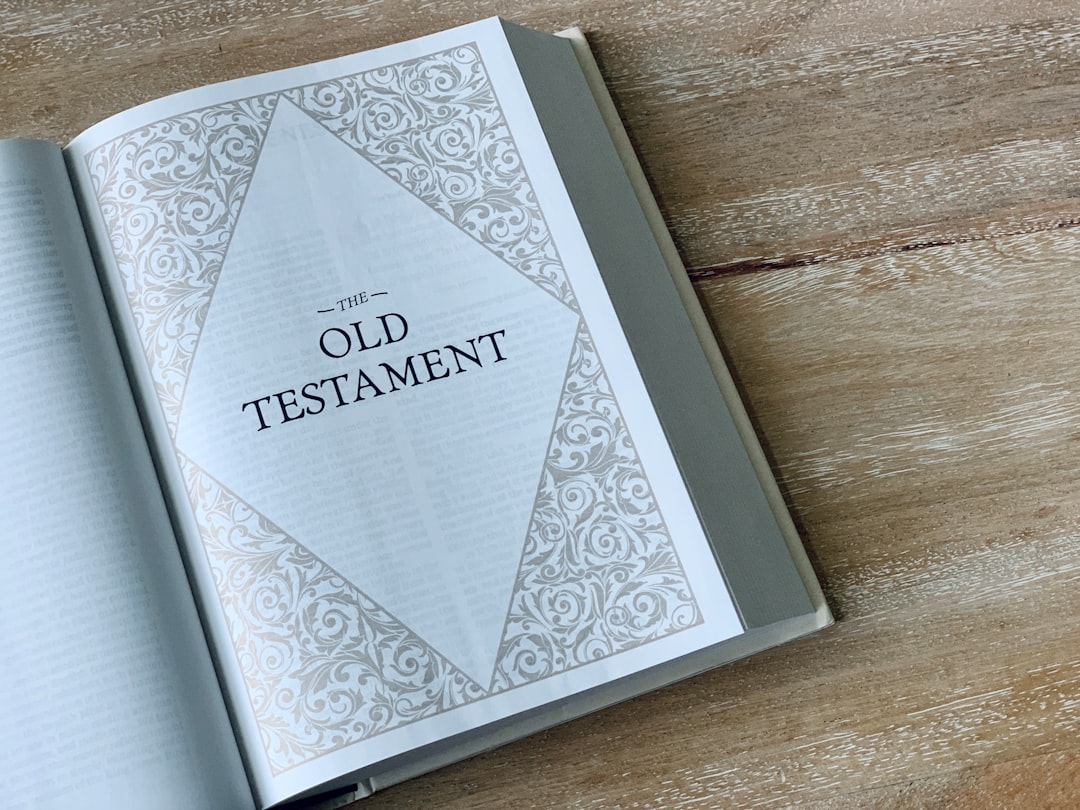
Naomi felt like her life had gone from “full to empty” and that even God Himself had turned His hand against her (Ruth 1:20).
As we study Ruth 2, we find God’s providence at work for Naomi and Ruth – and His kindness is shown to them through Boaz.
The Kindness of God (Ruth 2:1-17)
We Are Introduced to Boaz (2:1-3).
There was a relative of Naomi’s husband, a man of great wealth, of the family of Elimelech. His name was Boaz. So Ruth the Moabitess said to Naomi, “Please let me go to the field, and glean heads of grain after him in whose sight I may find favor.” And she said to her, “Go, my daughter.” Then she left, and went and gleaned in the field after the reapers. And she happened to come to the part of the field belonging to Boaz, who was of the family of Elimelech. (Ruth 2:1-3)
Boaz was a relative of Naomi’s husband. At this point, we only know he is related. At the end of the chapter, we will learn something very important about this family relationship.
Boaz is a respected pillar of the Bethlehem community; he is very wealthy and probably has distinguished himself as a mighty man of valor in a war.
Ruth asks Naomi’s permission to go to the fields during the harvest and gather grain for their food. Ruth “just so happened” to come to Boaz’s field – a sign of God’s providence at work.
Boaz’s Kindness Toward Ruth (2:4-13).
Now behold, Boaz came from Bethlehem, and said to the reapers, “The LORD be with you!” And they answered him, “The LORD bless you!” Then Boaz said to his servant who was in charge of the reapers, “Whose young woman is this?” So the servant who was in charge of the reapers answered and said, “It is the young Moabite woman who came back with Naomi from the country of Moab. And she said, “Please let me glean and gather after the reapers among the sheaves.’ So she came and has continued from morning until now, though she rested a little in the house.”
Then Boaz said to Ruth, “You will listen, my daughter, will you not? Do not go to glean in another field, nor go from here, but stay close by my young women. Let your eyes be on the field which they reap, and go after them. Have I not commanded the young men not to touch you? And when you are thirsty, go to the vessels and drink from what the young men have drawn.”
So she fell on her face, bowed down to the ground, and said to him, “Why have I found favor in your eyes, that you should take notice of me, since I am a foreigner?”
And Boaz answered and said to her, “It has been fully reported to me, all that you have done for your mother-in-law since the death of your husband, and how you have left your father and your mother and the land of your birth, and have come to a people whom you did not know before. The LORD repay your work, and a full reward be given you by the LORD God of Israel, under whose wings you have come for refuge.”
Then she said, “Let me find favor in your sight, my lord; for you have comforted me, and have spoken kindly to your maidservant, though I am not like one of your maidservants.” (Ruth 2:4-13)
Boaz arrives at the field for the day’s work, notices Ruth, and asks his supervisor, “Whose young woman is this?”
The supervisor’s response in the original language is rather difficult and not all that clear.
His response clearly shows that he isn’t thrilled that she’s there – there are undertones of racial prejudice in his answer - and that something either had just happened or was likely soon to happen to Ruth (assault, harassment, etc.).
Being a young, foreign widow and probably attractive, Ruth was not safe working without a protector among the common laborers in the fields. And Boaz “just so happens” to arrive that day – again, the providence of God at work.
Boaz approaches Ruth and encourages her to stay in his field and close to the young women working for him.
Boaz tells her that he had commanded the young men not to touch her – there would be no physical or verbal abuse of Ruth on Boaz’s watch. He also tells her to drink from the water that his young men had drawn.
In a cultural setting where foreigners would usually draw the water for the Israelites, and the women would usually draw the water for the men – Boaz demonstrates extraordinary kindness.
Ruth bows before Boaz and asks why he is showing her such kindness – which is further evidence that she probably hadn’t felt entirely safe up to this point.
Boaz responds that he had heard all about what she had done for her mother-in-law. He also knew that she had left the safety of her own home to come to a new land, a new people without the security of a reliable future. He acknowledges that she had given up her gods and had taken “refuge” under the “wings” of the LORD God of Israel.
Ruth Benefits from Boaz’s Kindness (2:14-17).
Now Boaz said to her at mealtime, “Come here, and eat of the bread, and dip your piece of bread in the vinegar.” So she sat beside the reapers, and he passed parched grain to her; and she ate and was satisfied, and kept some back. And when she rose up to glean, Boaz commanded his young men, saying, “Let her glean even among the sheaves, and do not reproach her. Also let grain from the bundles fall purposely for her; leave it that she may glean, and do not rebuke her.”
So she gleaned in the field until evening, and beat out what she had gleaned, and it was about an ephah of barley. (Ruth 2:14-17)
Ruth is amazed by the kindness of Boaz – he extends extraordinary generosity to her despite them being in totally different social classes and belonging to two different races of people.
Boaz had a kind heart toward the poor and outcasts of society (Exodus 22:21-23; Leviticus 19:33-34). And his kindness continued to climb to incredible heights – he invited Ruth to eat with them at mealtime and even served her some of the grain he was eating.
He then extends an “unheard-of-favor” (Younger) to Ruth – he orders his workers to allow her to gather from what they had already harvested. The workers were to let grain purposefully fall from the bundles they had gathered for her – and they were not to rebuke her.
Ruth worked all day and gathered about an “ephah of barley” – which was likely enough to feed two people for a week. If Ruth gathered about this much every day through the barley and wheat harvests (six to seven weeks) – then she would have gathered enough to feed her and Naomi for nearly a year!
Naomi Praises the Lord for His Kindness (Ruth 2:18-23).
Then she took it up and went into the city, and her mother-in-law saw what she had gleaned. So she brought out and gave to her what she had kept back after she had been satisfied. And her mother-in-law said to her, “Where have you gleaned today? And where did you work? Blessed be the one who took notice of you.” So she told her mother-in-law with whom she had worked, and said, “The man’s name with whom I worked today is Boaz.”
Then Naomi said to her daughter-in-law, “Blessed be he of the LORD, who has not forsaken His kindness to the living and the dead!” And Naomi said to her, “This man is a relation of ours, one of our close relatives.”
Ruth the Moabitess said, “He also said to me, ‘You shall stay close by my young men until they have finished all my harvest.’ ”
And Naomi said to Ruth her daughter-in-law, “It is good, my daughter, that you go out with his young women, and that people do not meet you in any other field.” So she stayed close by the young women of Boaz, to glean until the end of barley harvest and wheat harvest; and she dwelt with her mother-in-law. (Ruth 2:18-23)
Ruth returns to Naomi at the end of the day with the day’s harvest and gives her “leftovers” from lunch to Naomi.
Naomi observes that someone had obviously shown favor to Ruth for her to return with such a generous portion. When Naomi learns that the one who showed favor to Ruth was Boaz, Naomi praises the Lord for not forsaking His kindness to her and her family.
It’s as if the sun rises once again, and Naomi has hope in her life again because of the kindness of God demonstrated through the kindness of Boaz.
Naomi explains to Ruth that Boaz is a close relative of theirs – he is a “kinsmen’s redeemer.” There is hope for their situation.
Naomi urges Ruth to keep going to the fields of Boaz – he has shown kindness and offered his protection to Ruth. It would be foolish to abandon the kindness of Boaz.
While the previous chapter closes with a mere glimmer of hope, Ruth 2 ends with Naomi’s entire perspective changing from hopelessness to hope.
God does not abandon us in the dark times.
While Naomi thought God was working against her, God has proven that He was really at work for her.
Sometimes, when we face the challenges and difficulties of life, we become blind to this fact – but that is where faith comes into play (Hebrews 11:1).
Will others see God in us?
Boaz demonstrated the character of God Himself in his kindness to Ruth.
When we show kindness and generosity to others – perhaps those who are further down the economic ladder than us, or perhaps those of a different race than us – whose kindness is really at work through us?
What we do – how we see others – is how people will see God in this world (James 1:27).
We are called to put our faith and religion into action and live it out in our lives – like Boaz did. We are called to be doers of the word and not hearers only (James 1:21-25).
Boaz points us to the kindness of God through Jesus.
Naomi urges Ruth to remain in the field of Boaz, who had shown her such kindness. Boaz is an Old Testament illustration of the kindness God has shown us through His Son, Jesus Christ (Romans 5:8).
What will we do with the extraordinary kindness of Jesus Christ?














Lovely words. I’m really glad that in this analysis of the Book of Ruth, someone additionally went down the route of Boaz and how we can all do better to be a bit like him, spreading the goodness of God instead of only striving to be blessed like Ruth. You’ve shown us how it’s a possibility for us to bless others around us almost as much as it is possible receiving blessings! 🙏🏾❤️🔥 looking forward to the rest :)